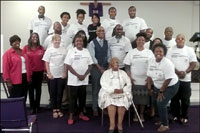
 7 PrEP Lessons Learned from Touring Four Florida Health Departments
7 PrEP Lessons Learned from Touring Four Florida Health Departments
Recently, Leisha McKinley Beach and I embarked upon the first leg of our tour of Southern health departments. We kicked off our journey in Florida, visiting the Miami-Dade (Miami), Broward (Fort Lauderdale), Orange (Orlando) and Alachua (Gainesville) county health departments. We also met with members of BTAN Melbourne, which is also in Florida.
It is really fascinating to meet with local health-department officials and rediscover: 1) how dedicated people who work at health departments are; 2) how under-resourced they are; and 3) how much work they are actually engaged in. We were excited to see that all four offer PrEP services. Some offer clinical services, while others provide PrEP education and awareness. Some have even constructed PrEP clinics. All are very committed and earnestly attempting to reach Black communities and are very interested in improving their efficacy in doing so.
Yet in the smaller cities of Gainesville and Melbourne as well as the major metropolitan areas of Broward, Miami-Dade, and Orange counties, all are wrestling with how best to provide PrEP to their communities. None has found the key to delivering PrEP services to Black Americans; none is as successful in reaching Black communities as they would like. As a result, most of the PrEP uptake still occurs among White men.
In some cases, the health departments are acknowledging some of the cultural challenges and organizational gaps they face.
Even where they’ve invested in new facilities, they are experiencing a case of “if you build it, they won’t necessarily come”. Indeed, while touring these four Florida health departments, we witnessed stunning reminders of seven basic concepts:
1) Medical mistrust in Black communities is real.
2) Separation based upon race exists in communities, even when people of different races live in close physical proximity.
3) The sense of urgency needs to be balanced with long-term perseverance.
!4) Service providers’ expectations about how quickly they can build a PrEP response tend to be unrealistic. Basic groundwork often remains to be laid, including improving both extremely low HIV science and treatment literacy and familiarity with biomedical intervention.
5) The message matters. All too often, the people making decisions about messaging may consult with the community, but they are not from the community. Rooms full of White decision-makers brainstorming about what’s important to Black people is not the same as Black people creating the messages. As a result, messages are being taken back to communities to be accepted, rather than the messages being developed by the communities themselves. To be most effective, messages must come from the communities they are intended to reach.
6) The messenger matters. Effective messaging requires even more than having race in common. It also requires a common lived experience, social and economic commonalities, and the community’s familiarity with the messenger.
7) Community engagement is often undervalued. That is to say: If you build it, they might not come. But if they build it, the probability that the communities that build it will participate increases. We need to appropriately value community engagement from the very, very beginning.
The Black AIDS Institute has developed a number of support materials, collateral materials, and trainings designed to help health departments expand the uptake of PrEP and other biomedical interventions among Black communities. We have a revised national PrEP report, a poster series for Black women and Black MSM, various fact sheets for Black communities (particularly Black women), and assessment instruments that can be used in Black communities. The Institute has also expanded our capacity-building teams to increase our ability to offer capacity-building and technical assistance to health departments, including to help them improve their efficacy with PrEP.
PrEP as an effective strategy in the epidemic is doomed if we’re not successful—and in a hurry—in expanding uptake among Black Americans.
Next week, following our visits to health departments in Atlanta, Alabama and Mississippi, we will share additional learnings. Soon we will run an issue on PrEP issue in the South.
Phill Wilson is the President and CEO of the Black AIDS Institute.


Be the first to comment